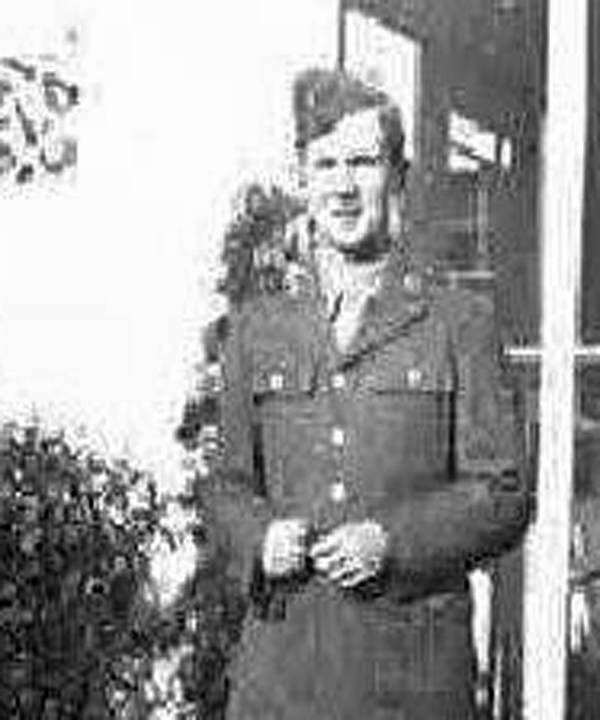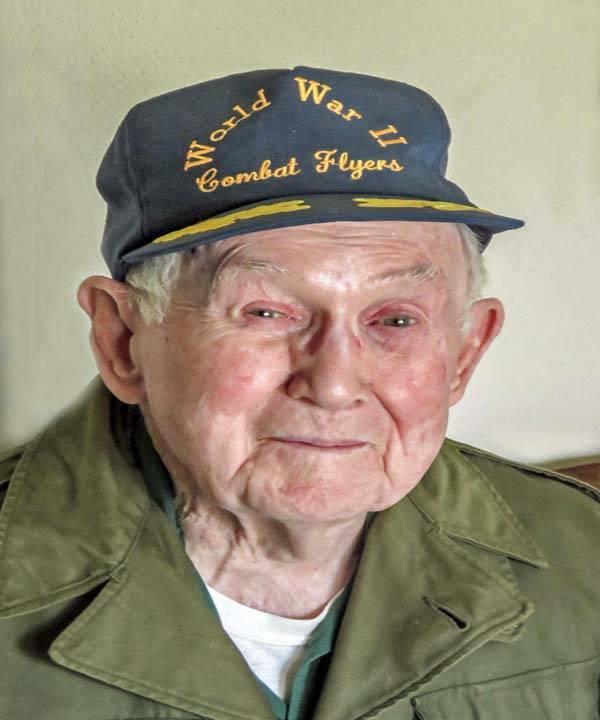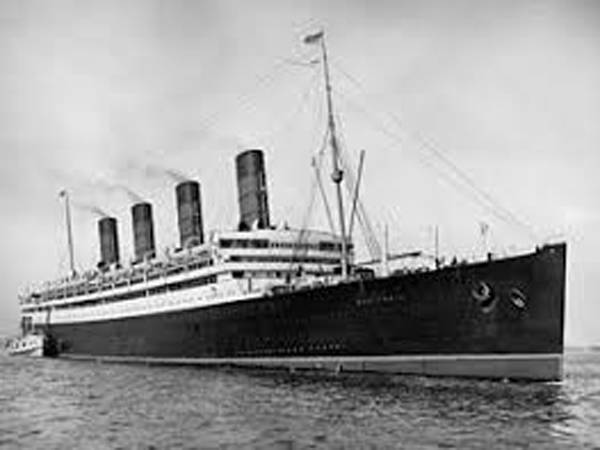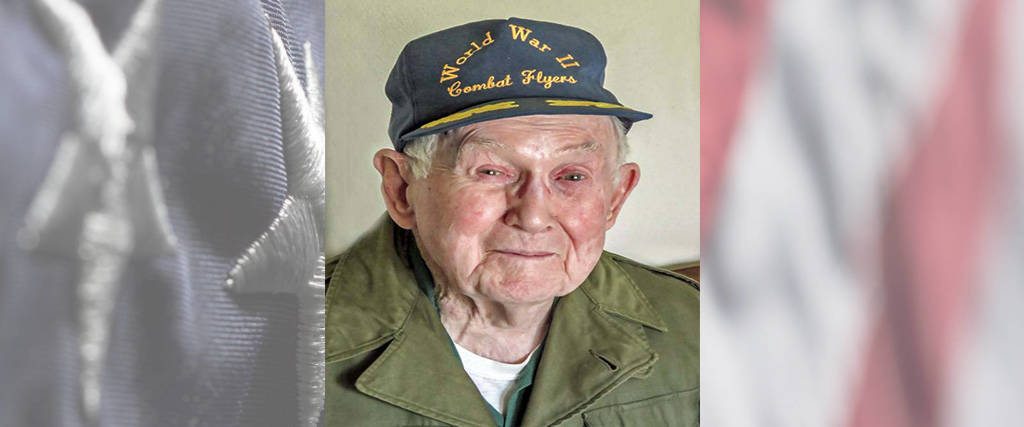U.S. Army World War II Rockford, IL Flight date: May, 2019
By Carla Khan, Honor Flight Chicago Veteran Interviews Volunteer
Although he grew up and lived in Belvidere, Illinois, William (Bill) Grady was born on his grandfather’s farm in Oregon, Illinois, the oldest of three children. After high school, Bill attended two years at Notre Dame University working towards a degree in Business and Accounting. During that time, he also tried to enlist in the service, but because that same day he’d also participated in a basketball tournament, his blood pressure was fluctuating too much for him to qualify. Shortly afterwards though, he was drafted and assigned to the Army Air Corps and sent for Basic Training to Sheppard Field, Texas.
In the spring of 1943, Texas was very hot and huge clouds of red dust “were flying in and back out to Oklahoma.” Because he suffered from hay fever and because the drill sergeant was fond of his recruits doing hundreds of deep knee bends, Bill tried to get out of outdoor physical training. He signed up for the boxing team but that didn’t get him out of physical fitness training. He graduated from Basic Training with his knees intact and continued to Sioux Falls, South Dakota, to become an expert in Morse code transmission. The course was given during the evening and put many of the soldiers to sleep. His next stop was Truax Field, near Madison, Wisconsin, in October of 1943. Bill was happy to be able to hitchhike home during off time. One challenge during this part of his training was to build a radio from parts. He succeeded and it worked! Another challenge was to overcome scarlet fever. He was the envy of his fellow soldiers when he was assigned a private nurse for a period of 36 hours. Following his recovery, he happened to run into one of his former high school classmates, Paddy, a red-haired young lady he would meet again later on in life.


With his radio building training successfully completed, Bill was ordered to Chinook Field, at Rantoul, Illinois, for advanced communications training. After a few weeks, his journey continued to Boca Raton, Florida, where he learned a lot about radar, reading screens and communications with aircraft. (He also had the advantage of being allowed to use the golf course.) His radar class had about 30 graduates, 15 of whom went on to Camp Kilmer, New Jersey, to await orders to be shipped out. While awaiting more instructions, Bill and the remaining new Airmen were shown a big hole in a chain link fence that offered an escape to visit New York City. The hole in the fence was so popular that in the evenings there often were long waiting lines for the men to get out. Bill fortunately was never caught during his escapades and he enjoyed visiting the Big Apple several times.

Finally, orders were received to board the RMS Aquitania. The ship was packed with about 8,000 military personnel. In order to ensure all aboard would go smoothly, Bill and his fifteen fellow Airmen were issued small rifles with one clip to “assist” the Military Police in case of trouble. The worst that happened was a card game that got out of hand and a couple of windows that were broken, but no guns were needed. They set sail the early morning of January 29, 1944, and headed for Glasgow, Scotland in the United Kingdom. The voyage was smooth but long and, according to Bill, “the porridge was terrible.”
Once in the UK, the group initially was sent to the Air Force Personnel Marshalling Ground near the small town of Stone where they experienced their first all blackout event. While there, they took courses in aircraft recognition and gunnery. On June 6, 1944, they were on a train headed for Pickenham where they would become part of the 491st Bomber Group. Although Bill’s main assignment was to ensure that the radar jamming devices on board the B-24 bombers were in perfectly working condition, he was also asked on several occasions to accompany the crew on their missions because of his gunnery training. As an added bonus, he could test out the quality of his transmitters, tune into the German radar, turn on his transmitters and disturb the frequency.
One of his most memorable flights was when they had to drop off wicker baskets with supplies of MRE’s (Meal, Ready-to-Eat), medical supplies, and ammunition for the troops that had just fought the Battle of the Bulge. The aircraft flew at an altitude of only 300 feet to drop their cargo. Another memorable mission was when they set out to drop some bombs and were attacked by enemy fire from all sides. According to Bill, “it was our job to jam their radar – we did well because we saw them aim away from us.” Nevertheless, it had been a extremely hazardous operation for which the crew earned a Distinguished Unit Citation from the President.
During a mission on May 8th 1945, the flight was suddenly recalled. Because the crew chief had never even removed the wires, they returned and landed at their base with their bombs still aboard. Other crews off-loaded their explosives in Brussels and replaced their cargo with liquor. The War in Europe was over and they planned to celebrate once they got back to the base.
Bill, with his skillset, was on a priority list to return to the States. His abilities earned him a spot on a B-24 to fly back rather than having to make another long voyage on a troopship. Still, it was a lengthy flight with fuel stops in Prestwick (Scotland), Keflavik (Iceland), Newfoundland, and finally landing in New Haven, Connecticut. At some point along the way, the crew was allowed to make a 15-minute phone call home and Bill surprised his father by asking him, “What’s for dinner?” A happy homecoming to Belvidere was followed by a well deserved 30 days of furlough.
His next assignment was going to be McChord AFB in Washington where he would work on a new aircraft, the B-39. But shortly after arriving, Bill was reassigned to Muroc Army Airfield in California. Suddenly, his college education in business paid off, because he was ordered to do the books at the PX (Post Exchange) Military store. Also Bill recalls that on the way to Muroc, they made a stop at a San Francisco hotel. There was so much commotion outside the hotel that his commanding officer would not let the Airmen leave the hotel. V-J Day had finally arrived!
Bill’s last trip under military orders was back to Chinook Field in Illinois where he was honorably discharged. His first priority was to enroll back at Notre Dame where he could now use the GI Bill to complete his education. One of his former professors asked Bill if he had gotten wounded during the war, “… because your grades are so much better now.”
Another person who noticed that Bill had grown up a lot (and so had she herself) was the red-haired girl named Paddy. They reconnected during a Christmas party in 1945 and got married in 1948 as soon as Bill graduated from college and had found a job as an accountant. They raised three boys and three girls; the family has expanded to include thirteen grandchildren and eight great-grandchildren. Paddy passed away in 2016, but among the family there is still one little redhead with the namesake of Paddy.
Following his military discharge, Bill was not quite done with his airplane connection. During his long working career, he also was the manager of the Rockford International Airport when the British Airways Supersonic passenger aircraft (SST) landed there in October, 1985.



